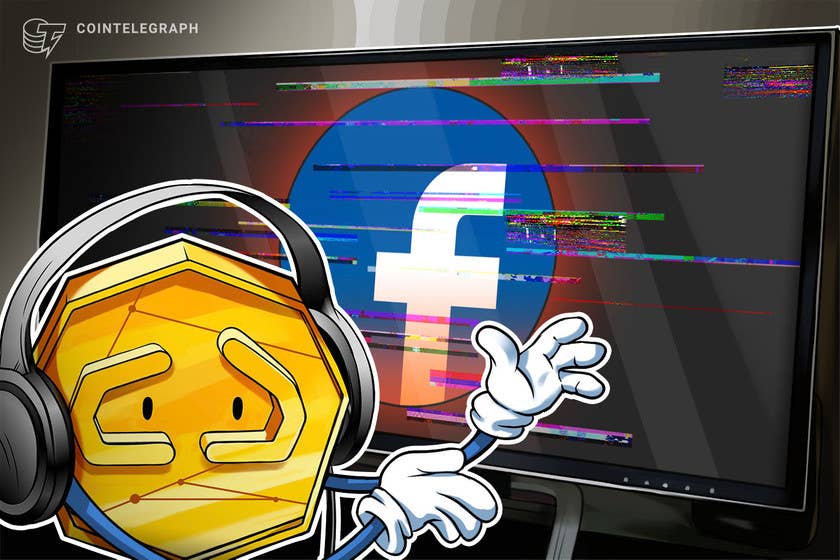Facebook’s social app conglomerate, including Instagram, WhatsApp, Messenger and its virtual reality headset, Oculus, suffered a major blackout on Monday, taking platforms offline for a total of six hours to impact billions of users and businesses across the globe. the whole world .
The incident was first reported around 3:16pm UTC on October 4 when a wave of complaints surfaced from users around the world claiming to be unable to access their favorite social media platforms.
Cloudflare’s post-crisis analysis concluded that Facebook “has stopped advertising paths to their DNS prefixes”, which means that the platforms have “unavailable DNS servers”.
Although a few individual allegations circulated about a suspected hack or tampering after the recent whistleblower story, no evidence has been officially reported to conclude these theories.
In an official blog post published on Tuesday, Facebook detailed their suspicions about the cause of the outage:
“Our engineering teams learned that configuration changes to the core routers that coordinate network traffic between our data centers caused problems that cut that connection.”
In the aftermath of March 2019 interruption, which lasted for twenty-four hours, Facebook also cited an issue with “change server configuration”.
The social media giant continued in a statement yesterday:
“We want to make it clear at this time that we believe the root cause of this outage was a faulty configuration change. We also have no evidence that user data has been compromised as a result of this downtime.”
Related: Bitcoin crosses $49,000 as Facebook, Instagram and WhatsApp drop
The dream of decentralization in Dorsey
As the Facebook giant stumbled into the public arena, crypto communities in search of open, decentralized social networks reverberated throughout the neighboring city of Twitter.
The Decentralized Standard for Social Media is an initiative that Jack Dorsey, CEO of Twitter, is excited to follow as reported in a 2019 tweet, and again earlier this year.
We are trying to do our part by funding an initiative around an open, decentralized standard for social media. Our goal is to be a customer of this standard for the public conversation layer on the Internet. We call it @the sky is blue: https://t.co/51or6OuNNv
– Jack (@jack) January 14, 2021
Apparently in response to Dorsey’s push, the CEO of DeFi lending protocol Aave, Stani Kulechov, has expressed ambitious plans to launch an Ethereum-based Twitter competitor later this year, claiming: “Since Jack will build Aave on Bitcoin, Aave should build Twitter on Ethereum.”
Ironically, via a tweet!
The Achilles heel of social giants
Over the past few years, an influx of ethical concerns about privacy breaches, data collection, censorship and fake news has fueled a shift for the renewal of the social media platforms that have come to dominate our democracy.
The prevalence and severity of such issues are beginning to deter conscientious users from moving away from centralized giants Facebook, YouTube and Twitter, in favor of more liberal alternatives.
The rapid emergence of cryptocurrency and blockchain technology, specifically its original features of decentralization, transparency, and community rewards, led to the emergence of these next generation initiatives.
Web 3.0, Platforms of Tomorrow represents the promise of cultivating a more equitable and inclusive model of digital interaction, and reorganizing the values of the social space to encourage freedom of expression, user well-being and autonomy.
Subsocial is an open platform for decentralized social networking and marketplaces built on the Polkadot and IPFS stack. It aims to provide users with complete data sovereignty, which means freeing up their sensitive data, content, and revenue streams to facilitate the development of fair, open and independent societies.
By using core features like spaces and posts, users can take a DIY approach to create their own decentralized versions of the most popular social apps we use today, such as Medium, Twitter, Reddit, Instagram, Patreon and more.
Recognizing the well-documented drawbacks of their predecessors, Subsocial users are given a full creative license throughout their experience, benefiting from “personalized feed and notifications, transparent reputation, full-text search, and rich content formats, without sacrificing SEO.”
As the project’s light paper states, the network is more than just a “blogging platform with crypto payments.” It’s “social finance where social media meets DeFi.”
Cointelegraph spoke to two active participants in the decentralized ecosystem seeking to build alternative Web 3.0-powered models for the current tech experience.
The founder of the decentralized search engine Presearch, Colin Pape, spoke about the importance of ownership in the social sphere:
Web 3.0 needs to be built beyond the issues that cause this outage: centralization. Instead, adopt a decentralized approach that puts power back in the hands of users and motivates them to help maintain a safer, more secure digital world, and most importantly, online when you need it.”
Anatha, CEO of Decentralized Autonomous Organization (DAO), Ed DeLeon, spoke about the potential impact DAO could have in the sector:
“Socially owned social networking appears to be one of the most obvious steps we can take to prevent this from happening again. The technological tools to build socially responsible, socially owned, and socially useful media platforms are already available, most notably Decentralized Autonomous Organizations (DAOs).









